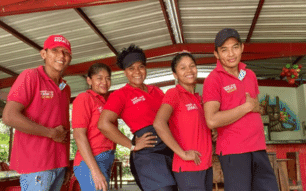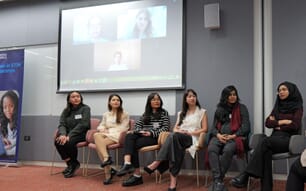Organised by the Japan International Research Center for Agricultural Sciences (JIRCAS), during the seminar
seven female speakers shared their findings and views on the participation of women in fisheries and aquaculture. The talks, which were attended by 160 people, were followed by a panel discussion and question-and-answer session.
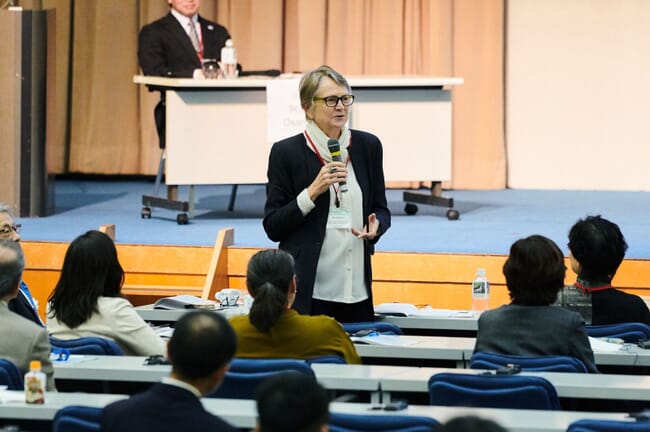
© JIRCAS
Among the key themes was how women can contribute to the United Nations Sustainable Development Goals (SDGs), food security and a healthy future.
After some opening remarks by JIRCAS President Dr Masa Iwanaga, Dr Meryl Williams of the Asian Fisheries Society began by outlining the present achievements and future prospects for female researchers and administrators. Although women are becoming recognised as the backbone of fisheries and aquaculture, she said, more can be done to make them visible in projects and programmes and increase funding for gender research.
"Women's future prospects seem brighter, but will depend ultimately on the directions taken by societies and economies," she said. "Gender research must also connect to the political economy, as this governs the possibility for transformative change and affects outcomes for women in fisheries."
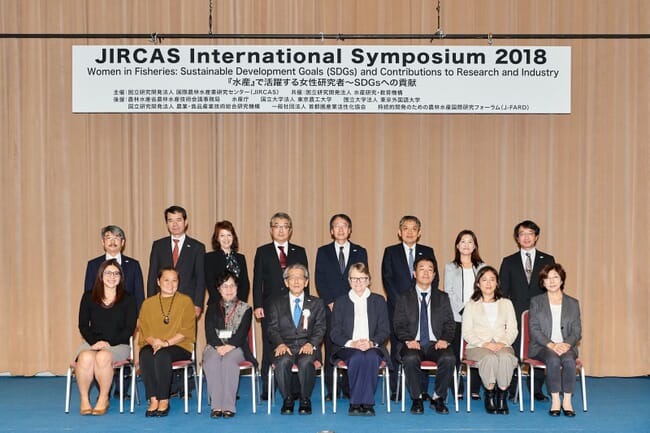
© JIRCAS
Dr Kaoru Nakata of the Japan Fisheries Research and Education Agency then highlighted efforts to increase the recruitment level of female researchers and promote women to management and decision-making roles. Having more women in leadership roles, she said, is likely to establish systems that take women's needs into account and utilise their talents. "The active participation of women will bring new power and energy to their respective communities and to Japan's fisheries sector," she said.
Yumiko Kura of WorldFish in Cambodia followed with a presentation on achieving the SDGs from the perspective of female researchers. Male and female researchers, she said, need to build the skills and knowledge to apply gender transformative approaches to their work to ensure that outcomes go beyond increased fish production.
The aquaculture department of the Southeast Asian Fisheries Development Center (SEAFDEC/AQD) was then introduced by Dr Evelyn Grace de Jesus Ayson, who described R&D efforts for sustainable aquaculture development towards food and nutrition security in Southeast Asia. The contribution of the female workforce in research, technology development and dissemination and capacity building programmes was acknowledged. Dr Bong Jung Kang of JIRCAS then followed with a presentation on her research into new seed production technology for commercially important shrimp species, while Professor Izumi Seki of Tokai University's School of Marine Science and Technology began the seminar's second session with a talk on women in fishing communities starting businesses in Japan.
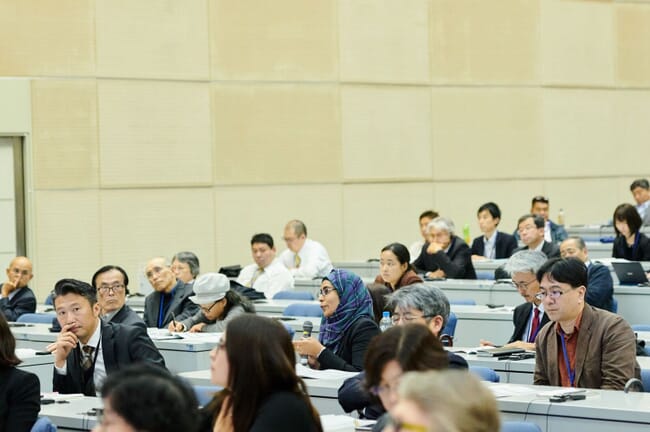
© JIRCAS
"This is a great way for these women to contribute, by publicising and selling local products and helping consumers understand more about fish and our precious marine resources," she said. "Their work is essential to maintaining a healthy demand for fishery products in Japan."
The Fish Site's Women in Aquaculture series was the subject of the last talk of the day. After outlining women's roles in both fisheries and aquaculture, regular contributor Bonnie Waycott, talked about the series in more detail by introducing five women (Lilian Elekwachi, Dr Sophie Fridman of the Aquagettes, Margie Saul, Dr Giana Gomes and Marie Tan) who were interviewed for the series this year. She described the initiative as a platform of positive stories about women's professional experiences, an opportunity for women to connect with one another and a way of highlighting their many contributions.
"With seafood a key source of nutrition worldwide, and aquaculture meeting the growing seafood demand, women's roles in this field are going to be even more important for food security," said Bonnie. "We hope that the series will increase awareness of the value that women bring to an exciting food production sector."
After giving examples of positive feedback towards the series, Bonnie emphasised a lack of data on the number of women in fisheries and aquaculture, which may be leading to less opportunities or less access to funding for women. The series, she said, hopes to address this lack of data by highlighting women's roles and responsibilities. She also touched upon the importance of diversity, as it can lead to a broader way of thinking and different ways of involving women in aquaculture and fisheries projects and programmes.
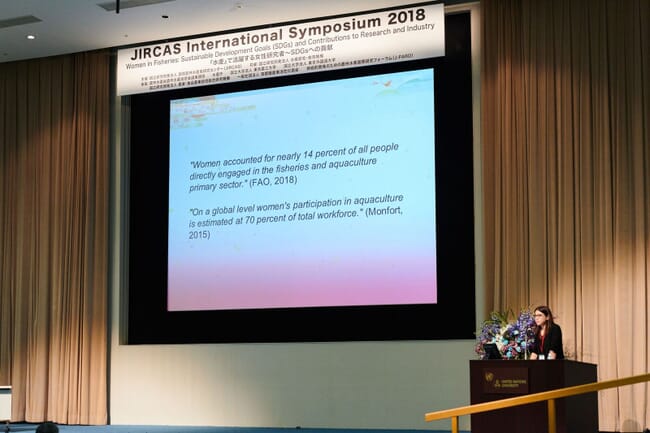
© JIRCAS
Audience members welcomed the case studies featured and were interested by how they highlighted areas outside Asia that they don't often hear about.
"Thank you so much for presenting a scenario of women's involvement - from the grassroots level right up to very advanced research in aquaculture," said Dr Zakea Sultana, Research Associate at the JIRCAS Fisheries Division. "As a woman, it was amazing and inspiring to hear such stories."
"The work of the women Bonnie introduced are very different to the roles of our researchers at JIRCAS," said Dr Masayoshi Saito, Director of the JIRCAS Research Planning and Partnership Division. "But having heard about the Women in Aquaculture series, we have a better idea of what women worldwide are doing in fisheries and aquaculture. Their work clearly ties in extremely well with the theme of our seminar - contributions to the SDGs."
"Fisheries and aquaculture aren't just about research or lab work," said Dr Marcy Wilder, Senior Research Scientist at JIRCAS. "You don't necessarily need particular qualifications or experiences. Bonnie's talk made that clear. I would also say that through today's presentations and discussions, we've gained a deeper understanding of the vital roles that women have in fisheries and aquaculture. It was a very productive afternoon."
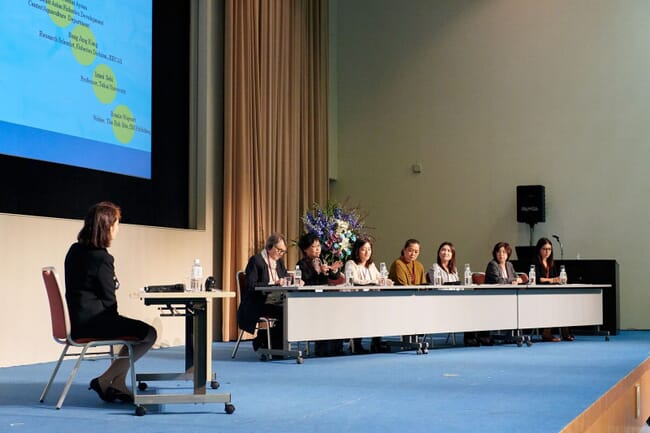
"I'm delighted that the series has been well received," said Bonnie. "It introduced some roles and responsibilities that the audience hadn't necessarily thought about before, and I've been very encouraged by Japan's efforts and viewpoints. I'm looking forward to seeing how things develop."
Closing the seminar, Dr Osamu Koyama, JIRCAS Vice-President, thanked the speakers and seminar organisers for a successful afternoon and reiterated the importance of establishing wider partnerships, inside and outside Japan, to promote women's involvement in fisheries and aquaculture.


